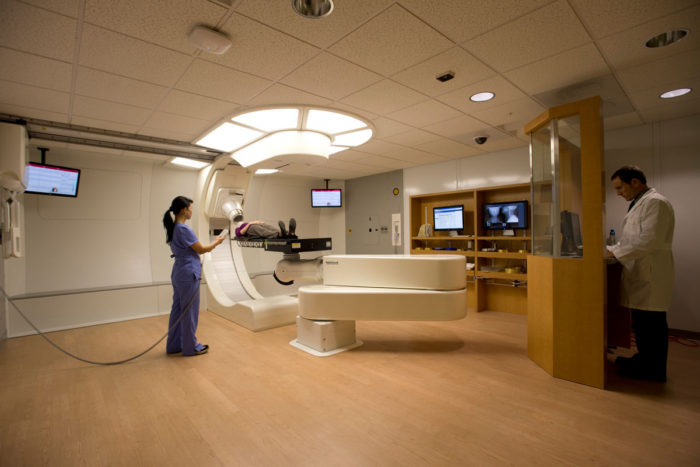Siteman Cancer Center to offer newest form of proton therapy
Pencil-beam scanning technology expected to be available in early 2020
 Mevion Medical Systems
Mevion Medical SystemsIn 2020, Siteman Cancer Center will open its second proton therapy unit on the Washington University Medical Campus. Incorporating the latest technology, known as pencil-beam scanning, the system will deliver extremely precise treatments of proton therapy, a type of radiation therapy used to treat cancers in particularly sensitive areas, as well as in children. The first system, pictured here, opened in 2013.
Cancer patients in Missouri, Southern Illinois and beyond will have access to a new generation of proton therapy in early 2020. Known as pencil-beam scanning, the technology delivers extremely precise treatments of proton therapy, a type of radiation therapy used to treat cancers of the head, chest, spine and other particularly sensitive areas, as well as pediatric cancers.
Construction will begin in early 2019 next to the region’s only proton therapy system, at Siteman Cancer Center at Barnes-Jewish Hospital and Washington University School of Medicine in St. Louis. The second proton therapy system will complement the first as part of an array of radiation therapy options.
“This especially precise technology is to cancer therapy what a very fine paintbrush is to painting,” said Jeffrey D. Bradley, MD, the S. Lee Kling Professor of Radiation Oncology at the School of Medicine and director of the S. Lee Kling Proton Therapy Center, where patients of Siteman and Siteman Kids at St. Louis Children’s Hospital are treated. “Either proton therapy delivery method is highly accurate and is aimed at sparing healthy tissue that surrounds tumors. But pencil-beam scanning technology provides the highest degree of precision. We’re pleased to be the first cancer center in the region to offer it.”
Pencil-beam scanning delivers proton therapy in a single, narrow proton beam aimed directly at the tumor and adjusted for intensity. The beam then “paints” the radiation dose on the tumor. Alternatively, Siteman’s first proton therapy system, available since 2013, precisely targets the tumor using magnets that scatter the proton beam across the tumor. The latter technology will continue to work well for most patients who are candidates for proton therapy, Bradley said. Both systems allow for extremely precise adjustments to the radiation beam, so physicians can precisely target tumors while minimizing damage to surrounding tissue.
“About 70 percent of all cancer patients receive radiation therapy, and as the technology improves, we want to ensure that our patients have access to the very best care and the latest treatments,” said Jeff Michalski, MD, vice chair of the Department of Radiation Oncology and the Carlos A. Perez Distinguished Professor of Radiation Oncology at the School of Medicine. “Pencil-beam scanning complements the array of radiation therapy technologies we offer and is delivered with the expertise of a team of Washington University physicians, physicists and other health-care providers who specialize solely in radiation therapy.”
Both proton therapy units at Siteman are manufactured by Mevion Medical Systems. Other specialized radiation therapy technologies available at Siteman include MRI-guided radiation therapy, CT-guided radiation therapy, Gamma Knife radiosurgery and stereotactic body radiation therapy. All are forms of external beam radiation therapy because the treatments are administered from outside the body. Another type of radiation therapy, brachytherapy, involves implanting “seeds” of radioactive materials next to the tumor. The type of radiation therapy used in a patient’s treatment depends on where cancer cells are located. Washington University radiation oncologists at Siteman select the most appropriate technology based upon a patient’s individual need, unconstrained by equipment availability.






